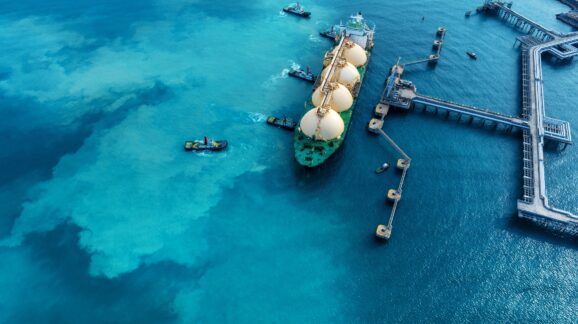Biden liquefied natural gas export ‘pause’ hurts Americans and our allies

Photo Credit: Getty
The Biden administration recently announced plans to pause approvals for new liquefied natural gas (LNG) exports to countries in which the United States doesn’t have free trade agreements (non-FTA countries). This means most countries, including all nations in Europe.
Under the Natural Gas Act, the Department of Energy (DOE) is required to review the applications of companies that want to export LNG to non-FTA countries. None of these applications have ever been rejected.
This major announcement was made in a fact sheet. The Administration explained that the pause is in order for DOE to “update the underlying analyses for authorizations.”
According to the Biden administration, updates are needed because the five-year-old analyses currently in use by DOE “no longer adequately account for considerations like potential energy cost increases for American consumers and manufacturers beyond current authorizations or the latest assessment of the impact of greenhouse gas emissions.”
There are a few things to say about this.
1) Let’s first consider the administration’s concern about energy cost increases domestically. This concern fails to properly recognize natural gas production levels in the United States and the ability to both export LNG while also keeping domestic prices low.
According to the American Petroleum Institute:
In the U.S., natural gas prices remain among the lowest in the world according to the International Energy Agency (IEA). While U.S. LNG exports reached record highs in 2023, domestic prices declined 62% as U.S. natural gas production also surged to record levels—demonstrating this industry’s ability to meet rising global demand for natural gas while maintaining a well-supplied domestic market.
Ironically, the administration’s pause will likely drive up domestic prices. Creating uncertainty in the future of LNG exports will result in higher prices not lower prices.
At present, the United States produces more natural gas than it consumes, and is the largest global producer. LNG export terminals are large, capital intensive projects. If companies can’t rely on being allowed to build new facilities, then they’ll be less likely to build them. Fewer planned exports would lead to less production, because producers are going to respond to the government created limitations and be disincentivized to produce. This would result in less supply. All of this coalesces into eventual higher prices both at home and abroad.
2) Addressing the administration’s question about carbon emissions, we should ask: If the administration is concerned about global greenhouse gas emissions, would it be better for American producers to export more LNG, or to hoard it domestically? The answer is, “It’s better to export.”
DOE has repeatedly found that along with the economic benefits, exports of US LNG could reduce global greenhouse gas emissions. A 2019 study commissioned by DOE compared the total greenhouse gas emissions involved in the production and delivery of US natural gas and Russian natural gas to the same location in Europe (Rotterdam, Netherlands). For context, the US is the world’s largest producer of natural gas and Russia is the world’s second largest producer.
Based on data from the study, the US gas was about 29 percent less greenhouse gas intensive than the Russian gas.
If US LNG exports decline, foreign countries that look to the US to meet their natural gas demand will turn to other natural gas producing countries, including Russia.
The procedural flaws of the pause
The administration made this critical decision to pause LNG exports by releasing a fact sheet as opposed to going through notice and comment rulemaking. This is inappropriate and potentially even violates the protections in the Administrative Procedure Act.
Further, the administration isn’t respecting the plain language of the Natural Gas Act. Specifically under the Natural Gas Act, DOE “shall” approve an application unless DOE finds that it is not “consistent with the public interest.”
Instead of following this clear default assumption in the law to grant applications, the administration is acting as if the default assumption is to reject applications. As stated above, no application of this type has previously been denied on public interest grounds.
Substantive harms of the pause
As a preliminary matter, the federal government shouldn’t be impeding the free flow of goods between willing parties without an exceptionally good reason.
The government should also not be taking actions that will raise energy prices for Americans. This pause will likely raise prices domestically, hurting American families and businesses.
Further, no administration should advance energy policy that empowers foreign countries while simultaneously weakening the United States. This pause provides foreign countries, including unfriendly countries, significant leverage in the global natural gas market. The pause is particularly useful to Russia at a time when ceding geopolitical power over a critical energy resource would be a terrible misstep.
What Congress should do
Ideally, the administration should immediately lift the pause. Since this is unlikely, Congress should pass legislation to block this harmful administration action. The ability to export LNG is crucial to help keep energy prices low and reduce the influence and power of countries such as Russia on global energy markets.